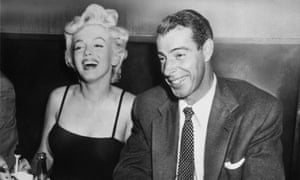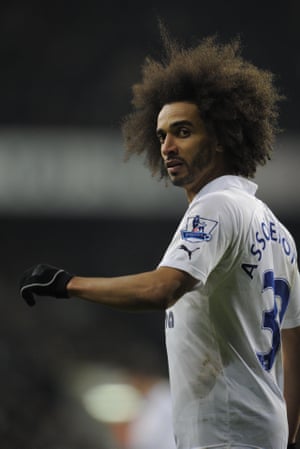1) Andre Agassi
No great professional athlete truly hates their sport. That would be impossible. No one can fake those hours of workouts and practice. But there are players who love sports more than others, whose lives become the game they play for a living. This is about those others, the ones who were either never consumed by their sport or came – for a time – to despise it.
Agassi wouldn’t be the first athlete to say he had been shoved into a sport by an overzealous parent. Tennis is loaded with players who were shipped off to camps as children to be force-fed an existence of rackets and bouncing yellow balls. But while other tennis players hid their occasional boredom with the game, Agassi wore it openly. He was one of the most perplexing star athletes of his time. He came from Las Vegas and seemed every bit a product of his hometown where nothing is real.
No one seemed to know who Agassi was. He contradicted himself often in his career, defined early by his ‘Image is Everything’ ad campaign for Canon cameras – a period when he became more about what he wore than how he played. No time was more disturbing than his denim tennis shorts phase. Throughout his playing days Agassi portrayed himself as caring more about celebrity and less about actually playing tennis, then months later he would say he was misunderstood.
So it is hard to know how serious Agassi was in his 2009 autobiography Open when he wrote “I play tennis for a living though I hate tennis, hate it with a dark and secret passion, always have.” Was this an admission? A ploy to sell books? Or the words of his co-author? With Agassi you never knew. Mystery surrounded him. If he really hated tennis it didn’t show as he grew older. Looks became less of his game and he became the world’s best player, at one point finishing his career with eight major titles and an Olympic gold medal.
Hardly the life of a man who hated tennis.
2) Chris Kluwe
A few years ago, I visited Kluwe in Minnesota when he was still the Vikings punter. Early in the conversation he revealed that he didn’t like football much. Given his intense interest in gaming (the television in his living room was only for games and not connected to cable), the fact he painted figurines from games during downtime at Vikings practices and the time spent with his band Tripping Icarus, his lack of excitement for football was understandable.
Kluwe grew up playing soccer as the genius son of a doctor and a scientist. Years later, his mother Sandy would sigh when talking about her boy who picked football and say: “He could have found a cure for cancer … and he’s not.” Football was almost an accident. His high school team needed a kicker and he could kick. It wasn’t his fault he wound up being good at it.
Perhaps the best Kluwe story came from his wife Isabel, who was a freshman working in UCLA’s football office when Kluwe committed to the school as a high school senior. She took a liking to Kluwe and sat next to him and his father when they came to Bruins games that season before he came to college. But when the games started, Kluwe would pull out a book and read, leaving his father and Isabel to talk and watch the game that UCLA’s football recruit showed little interest in seeing.
Though Kluwe had several good seasons punting for the Vikings, where he played for eight years, he became more famous for the things he did away from football – namely his vocal support of gay marriage. The Vikings did not seem to like having an activist punter and cut him in 2013. A few months later he retired from football, probably one of the few ex-NFL players who did not anguish over giving up the game.
3) Joe DiMaggio
The only baseball player who might surpass DiMaggio’s prominence in American culture is Babe Ruth. No one else married this actress, inspired this song or this song or sold this. His 56-game hitting streak in 1941 may never be topped. Neither might his significance as the graceful Yankees center fielder who made the hardest plays look simple. Yet he never seemed to play with passion. He was an aloof star, praised in history for never showing much emotion … perhaps because he never felt great joy as a baseball player.
But Richard Ben Cramer’s 2001 biography of DiMaggio: The Hero’s Life described a young man in San Francisco who was not motivated to play baseball, watching instead as the other boys played in local parks. “It was a means of making money, he didn’t think of it as anything other than that,” Jerome Charyn, the author of Joe DiMaggio: The Long Vigil told NPR in 2014.

DiMaggio wouldn’t be alone, especially today. Many baseball players have come slowly to the sport or admit they are not fans of it. Florida Marlins second baseman Dee Gordon grew up the son of a big league pitcher, Tom Gordon and yet he still didn’t like baseball as a child saying: “There were no girls at baseball games (in high school), why should I play baseball?” Recently Washington Nationals infielder Anthony Rendon called baseball “boring.”
DiMaggio never appeared bored with baseball. but he didn’t seemed enamored either. His detachment was part of his appeal but it made him complicated too. He died in 1999, a man consumed with money and his image, demanding later in life to be called “Baseball’s Greatest Living Player” at all public functions.
4) Elena Delle Donne
Today Delle Donne is one of the top players in the WNBA. Efficiency statistics say one of the best seasons a professional player in the US – male or female – has ever had. Given the ease with which she plays, using her 6ft 5in height to power over smaller players while also being accurate shooting outside, it’s easy to forget she once quit the game, refusing to pick up a ball for months.
This came after high school, after three years of recruiting battles that drained her of her passion for playing. When she showed up to the University of Connecticut for her freshman year, she saw the amount of time she would have to commit to basketball and felt … nothing. She missed her family in Delaware, especially her sister who has cerebral palsy. “I blamed basketball for taking me away from home,” she said in 2009. “I hated the sport. Every time I played basketball I felt sick to my stomach. I didn’t realize that feeling was having to leave my family – having to leave my sister who can’t even communicate with me when I’m gone.”
After two days at UConn she returned home, enrolled at the University of Delaware where she played volleyball. A year later, she went back to basketball and found she could love it again. Now she is three seasons into a professional career with the WNBA’s Chicago Sky where she has grow into of the league’s most dominant players.
5) Benoit Assou-Ekotto

The possessor of some of the finest hair in sports, the left back from France who played internationally for Cameroon always seemed tormented in his near-decade with Tottenham Hotspur. He spoke often of his honesty which was usually blunt and dramatic, but he was also interesting and thoughtful.
He seemed to find the Premier League to be a vain place and sometimes expressed his boredom with playing in England, despite the fact he was well compensated to do so. “I don’t say I hate football but it’s not my passion,” he confessed in 2010. He said he played for the money. Some would say he was simply being one of the most honest athletes around, but it’s hard to watch Assou-Ekotto play and believe he is passionless about the sport.
6) Anthony Perkins
Perkins, of course, was never an athlete but an actor most famous for playing Norman Bates in Psycho. Still Perkins once famously played an athlete in the 1957 story about baseball player Jimmy Piersall called Fear Strikes Out. Perkins, it turns out, hated baseball and hated sports in general. This was a challenge because the movie called for him to actually play baseball. The fact he looks and acts like a ballplayer in the movie is part of what sets it apart from countless other sports movies whose action looks forced and awkward.
“Tony wasn’t an athlete, he couldn’t throw a ball,” his co-star Karl Malden later said. The film crew brought in a baseball player, Tommy Holmes, to teach Perkins to throw. Part of the problem, Malden told Turner Classic Movies that Perkins was left-handed and was trying to play a ballplayer who threw right. Eventually, Perkins learned to throw and his portrayal of Piersall, who had a nervous breakdown as a player, was outstanding.
Meaning sometimes a hatred of sports, just like fear, strikes out.



